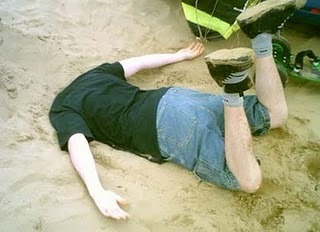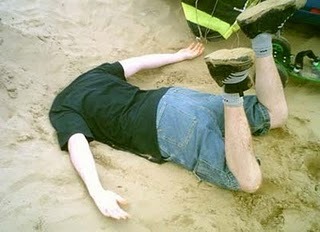A friend of mine, a self-employed engineer who freely admits to being more than a million dollars in debt, recently told me that the start of Global Financial Crisis thrust him into a period of gloom. Doom-laden headline after headline ground down his optimism and zest. Then, after a few months of depression, he made a terrific decision. He chose to ignore the news. To be specific, he stopped watching TV news. He just blanked it out.
The effect was dramatic. His spirits lifted. He got on with his life. He found that new business kept coming in. His work got done. His mortgage got paid. He discovered that the GFC was something he could safely ignore.
It seems that a lot of Australians may have made similar choices, for the Australian economy has weathered the GFC far better than any economy in the world. According to the Reserve Bank, consumer confidence dropped less than in the other major economies; businesses retrenched fewer workers; and business investment remained surprisingly high.
Instead of slashing their wrists, Australians may have just stopped paying attention to the news and got on their lives.
Denial is a well studied psychological phenomenon (just Google “cognitive dissonance”). As psychologists understand it, denial is all about protecting the self or identity. When someone is presented with information that challenges their identity they experience mental discomfort or dissonance. There are two ways to reduce that discomfort. They can either change their behaviour or they can avoid that information in future. Since avoidance is almost always easier and less risky than change, most people choose avoidance. Or, as J.K. Galbraith put it, “Faced with the choice between changing one’s mind and proving there is no need to do so almost everyone gets busy on the proof.”
Denial gets a bad rap. Being “in denial” is supposed to be an example of mental feebleness. But there is a potent connection between denial and economic prosperity.
Behavioural economists George A. Akerlof and Robert J. Shiller, in their book Animal Spirits, How Human Psychology Drives the Economy and Why it Matters for Global Capitalism, make a valuable point about confidence. Confidence, they wrote, is the key “animal spirit” in an economy: “When people have confidence they go out and buy; when they are unconfident they withdraw, and they sell.”
Confidence, they pointed out, is not just a certainty that good times will keep rolling. The word comes from the Latin fido, meaning “I trust”. But trust is not a positive form of mental activity. It’s actually a form of mental inactivity. It consists of not thinking about consequences, of hoping for the best, and assuming that someone else has done the job of risk management. Trust is a low energy mental state and it’s easy to see why this is so. If we worried about everything in life, we’d go crazy. We’d be paralysed with doubt because of all the agonisingly complicated uncertainties surrounding every decision. Lack of trust, that is, the active mental state of mulling over consequences and worrying about details, is something that inhibits economic activity. Trust, that is, not thinking much about the consequences, is therefore much more than bliss, it’s one of the root causes of national prosperity.
Denial is nothing less that the choice to return to a state of trustful ignorance. Being in denial, far from evidence of feebleness, is therefore a fantastic strength. Think about it. Without denial would there ever have been a successful rebellion or revolution in history? No. It would all be too confronting. Worrying about the ranks of muskets and cannon lined up against them would have terrified all those potential revolutionaries into helplessness. And there would never have been a paradigm-challenging idea: no renaissance, no heliocentric theory, no electricity, no penicillin, no stapler. Without denial of the near certainty of failure, all the revolutionaries who made our world would have stayed at home. True, denial can sometimes be a weakness. But very often it’s a great strength.
Now you have to wonder, since Australians have retained their economic confidence far better than Europeans and Americans, what makes us such superior denialists? Americans in particular seem to have gone into a blind panic. I’m just speculating now, but one explanation might have to do with our native self-doubt. Without swollen egos, there’s less far to fall. Stick a pin in Americans’ party balloon and the result is mass hysteria. Deflate our party balloon, and, deep down, we’re not all that surprised.
Another explanation may have to do with how sensible we are. Denial, you see, is always easier when it’s backed by some evidence. Australians, like practically everyone else in the world, would have been startled into alertness by the sudden collapse of the US economy. Most of us aren’t idiots, so before slipping back into the sweet balm of semi-consciousness we would have looked around our neighbourhood for some evidence that it was safe to do so. We saw: a government confidently and aggressively responding, local institutions not collapsing and NO ONE ELSE PANICKING. There’s a well-established principle in the social sciences called ‘social proof’ which can be expressed as ‘if those around me think there’s no problem, there’s no problem’. Thanks to a few comforting real life observations, Australian’s seem to have decided that it was safe to lapse back into trust and get on with their lives. What became a contagion of panic in the US and Europe became a contagion of denial here, and we’re all the better for it.
Yes, denial: our saving grace; our life boat in a storm; our national treasure. Let’s give it the respect it deserves.
————————-
This piece is not just frivolous. Denial is something change agents struggle with every day. Denial
has it’s own logic: it’s driven by the fear of not being able to manage the unfamiliar. Trying to “drag people out of their comfort zones” is a recipe for failure because the human capacity for denial is infinite. A solution is to focus on increasing people’s confidence or self-efficacy (in other words, EXANDING their comfort zones), an approach which minimises the fear that causes denial!
* Malcolm Edey, Assistant Governor, Reserve Bank of Australia, The Economic Landscape in 2009, www.rba.gov.au/Speeches/2009/sp_ag_040309.pdf

